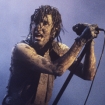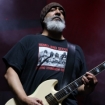"Sometimes I try songs and they don't sound so good."
Chris Cornell is speaking to an audience in Reading, Pennsylvania. It's 2013, and the Soundgarden singer is in the midst of a solo tour. He's standing onstage with an acoustic guitar telling the story behind the next song in his set. The crowd is waiting on his every word.
Cornell explains he was searching for the lyrics to U2's mega-hit "One" — except Google served him up the lines to Metallica's much grimmer … And Justice for All song by the same name. "When the Metallica lyrics came up, I thought, Well, fuck, let's see what that sounds like?" he says to the crowd, before launching into the song.
Not only does Cornell's experiment work — as seen in footage of that performance below — his mashup of the thrashers' nightmarish post-war lyrical themes with the Irish band's melancholy melodies is an unexpected stunner.
Throughout his celebrated career — and even up to Soundgarden's final show the night before his tragic passing on May 18th, 2017 — Cornell was no stranger to transfixing audiences. He was a grunge Adonis and one of the greatest singers of his generation (which puts him on par for one of the best frontpeople in all of rock & roll history). As a bandleader and songwriter, he gave the world some of heavy music's most powerful and iconic songs: "Black Hole Sun," "Rusty Cage," "Outshined" "Fell on Black Days" and more.

And when Cornell covered other artists' compositions, the fact is — despite his self-effacing setup for the Pennsylvania crowd — most of his attempts sounded really, really good. The singer's exceptional gifts allowed him to transform and personalize well-known songs by a diverse range of musicians — including Prince, Michael Jackson, the Cure, John Lennon, Dolly Parton, Black Sabbath and more — without sacrificing the essence of the originals.
His careful and creative approach to covering songs reflected Cornell's deep love and respect for rock & roll. This reverence developed many years before fame and fortune came his way, back when he had no aspirations for rock-star greatness and was just another budding music fanatic growing up in the Pacific Northwest.
"It made me feel like I hadn't felt before," the singer told the Los Angeles Times in 1991 of first discovering the Beatles when he was a child. "Sort of a strange euphoria. I remember having the single ["Hey Jude"]. I was probably 6 or 7 … Rifling through my neighbor's older brother's records was a common thing, and listening to Lynyrd Skynyrd and Alice Cooper and the Beatles."
Cornell's passion deepened as he entered his teenage years, and it eventually inspired him to start writing his own songs.
"I did a lot of listening to music alone," he told Revolver in 2012. "That's sort of how I became a musician, just based on years and years of being a super-geeky music fan. I didn't really think of being in a band or making records or writing songs until I was probably 17, 18 ... I wrote songs and stuff, but I didn't think that was what I was going to do until I was in my late teens. Listening to an album was definitely like a really important escapist thing that I completely dove into."
After his early rock indoctrination through classic bands like the Beatles, Led Zeppelin and Pink Floyd, Cornell's tastes widened to include fringe and outsider acts. An adventurous consumer, he would sometimes roll the dice and check out a new artist simply because of the album art.
"The first Bauhaus record I bought was a live record [Press the Eject and Give Me the Tape]," he told Revolver. "Peter Murphy's hiding his face behind a cymbal — which is removed from the drum kit, which I liked — and he's singing. Something about that just spoke to me, like, 'I don't know what this is, but this has to be great.' They became one of my favorite bands."

Cornell's musical curiosity continued throughout his life and was expressed in his boundary-pushing career in Soundgarden, Temple of the Dog and Audioslave, as well as his solo work collaborating with R&B producer Timbaland or guesting with the Seattle Symphony Orchestra. The same daring spirit also infused the covers that he shared with listeners over the years.
On December 11th, the Chris Cornell Estate surprise-dropped a new collection of Cornell covers, No One Sings Like You Anymore, which further showcases his impressive range, bold inventiveness and range of influences. The 10 songs contained on the album were recorded by Cornell in 2016 (making it his last fully completed studio album before his death) and include spirited interpretations of classics by Guns N' Roses, John Lennon, Prince and more.
To celebrate the release of No One Sings Like You Anymore, we compiled 10 of Cornell's greatest covers from throughout his career.
U2/Metallica - "One"
As mentioned above, Cornell was an unnaturally gifted (and humble) songwriter — and even his "mistakes" often came up golden. Such is the case with his inventive U2/Metallica mashup. In lesser hands, recontextualizing Metallica's terrifying lyrics in U2's song structure could have easily come off as a gimmick. But with Cornell, some strange alchemy happens: the whole goddamn thing takes on a new meaning and becomes an honest-to-goodness tearjerker.
Sinéad O'Connor - "Nothing Compares 2 U"
"Nothing Compares 2 U" was written by Prince for the 1985 eponymous debut from his side-project the Family. But the song achieved worldwide notoriety five years later when Irish singer-songwriter Sinéad O'Connor released her heart-rending version of it on 1990's I Do Not Want What I Haven't Got. Cornell was a big Prince fan, and praised this song's "timeless relevance for me and practically everyone I know." For his acoustic reworking, he opts for a simple guitar arrangement that allows the focus to fall on the song's mournful lyrics of lost love — which take on serious gravitas thanks to Cornell's rawer rock-vocal stylings.
The Beatles - "Come Together"
The Beatles were a formative creative influence for Cornell, and he covered quite a few of their songs over his career, including "Helter Skelter," "A Day in the Life," as well as Lennon's solo classic "Imagine." But none of those hit as hard as Soundgarden's mammoth take on "Come Together," from the Beatles' 1969 album Abbey Road. Originally released as a B-side for the Seattle crew's 1990 single "Hands All Over," Soundgarden crank the volume to 11 and accentuate the song's groovy rhythm with screeching, stretched-out doomy heaviness — as Cornell's howling verses add heft to Lennon's original hooky chorus.
The Doors - "Waiting for the Sun"
In November 2011 Soundgarden released Before the Doors: Live on I-5 as a Record Store Day exclusive. The 10-inch contains five songs that were recorded at soundchecks during the group's 1996 tour, including a far-fucking-out take on the Doors' "Waiting for the Sun" (from 1970's Morrison Hotel). Guitarist Kim Thayil turns Ray Manzarek's iconic keyboard lines into absolute crushers as Cornell channels Jim Morrison's build-and-release energy through the verses — before the whole thing reaches its fuzzed-out apex of wailing guitars and ferocious vocals.
Black Sabbath - "Into the Void"
Sabbath's behemoth closer to 1971's Master of Reality boasts one of the greatest heavy riffs ever. Soundgarden's Thayil, bassist Ben Shepherd and drummer Matt Cameron are up to the task and nail the gnarly groove. But the most fascinating thing about their cover is Cornell's decision to replace the original lyrics with protest words attributed to Chief Seattle, the Native American leader for which the city takes its name. Soundgarden released their powerful version, titled "Into the Void (Sealth)," in June 1992 on the Badmotorfinger bonus EP Satan Oscillate My Metallic Sonatas. The track became a fan favorite and went on to receive a Best Metal Performance nomination at the 1993 Grammy Awards.
Michael Jackson - "Billie Jean"
Cornell leans into the somber undercurrents of "Billie Jean" in his impressive downtempo reworking of Michael Jackson's 1983 Thriller hit. Cornell told Rolling Stone that the "brilliance" of the song first hit him when he read its lyrics (which are epitomized in the lines "She says I am the one/But the kid is not my son"). "I realized it's a lament, not a dance track," he said in 2009. Cornell accentuates the solemn vibes through his introspective alt-rock reworking, which appears on his 2007 solo album Carry On. The singer flexes his remarkable vocal range throughout the track's dynamic arrangement. It's a mesmerizing mix that leaves the listener hanging on every word he sings to see what's coming next in the tale. "The story isn't spoon-fed to you, it's poetic," said Cornell.
Guns N’ Roses - "Patience"
Cornell's striking rendition of GN'R's 1989 ballad "Patience" — which was posthumously released on July 20, 2020, on what would have been the late singer's 56th birthday, and included on the new No One Sings Like You Anymore — finds him pairing the original's laid-back acoustic instrumentation with dark waves of droning synths and attention-grabbing percussion. As with many Cornell tracks, his voice is the show stealer and a perfect match for the song's subject matter: world-weary, full of longing and completely arresting.
Led Zeppelin - "Whole Lotta Love"
In terms of covers, Chris Cornell was ready-made to take on Led Zeppelin. The singer's massive pipes and raspy range are squarely in the lineage of classic rock's premier golden-god frontman Robert Plant. (There were even reports that Cornell was interested to sub for Plant on a 2008 Led Zeppelin tour that never materialized.) In 2010 Cornell teamed up with another icon, Carlos Santana, for an expert take on Zepp's 1969 banger "Whole Lotta Love" (which appears on the guitarist's covers album Guitar Heaven). Santana adds a touch of his psychedelic Latin-rock flavor to the Brit's blues-rock original as Cornell swings for the fences covering Plant's iconic wails and rallying cries.
Mad Season - "River of Deceit"
Mad Season was a Seattle supergroup featuring Alice in Chains singer Layne Staley, Pearl Jam guitarist Mike McCready, Screaming Trees drummer Barrett Martin and bassist John Saunders of the Walkabouts. They released just one album, 1995's Above, and "River of Deceit" was its undeniable standout. On January 30th, 2015, Cornell joined the Seattle Symphony Orchestra and surviving Mad Season members McCready and Martin (plus GN'R bassist Duff McKagan) to perform the track. While Cornell would add a stripped-down version of "River of Deceit" to his subsequent acoustic tours in support of the solo record Higher Truth, his appearance with the Seattle Symphony showcases his most dramatic and sweeping take on this grunge classic.
Body Count - "Cop Killer"
In March 1992, rapper Ice-T stormed onto the metal scene with the release of Body Count, the self-titled debut from his crossover thrash group. The vicious album was a pit-starting — and shit-stirring — success, thanks in large part to its controversial closer "Cop Killer." While Ice-T maintained that the track was a protest song against police brutality, at the time it was widely maligned by conservatives: from PMRC founder Tipper Gore to President George H.W. Bush. Soundgarden were all about "Cop Killer" and performed it for the flannel-clad masses throughout their Lollapalooza 92 run later that year. At the August 22nd stop in Miami, they invited Body Count guitarist Ernie C. to join them onstage to play the song. And while the footage isn't the best, Cornell's impassioned performance is unmissable.












